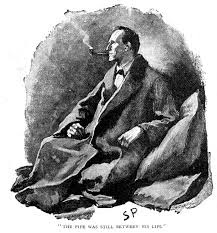T.S. Eliot once wrote, "Every writer owes something to Holmes." That's certainly true of every mystery writer, from soft boiled to hard boiled. We all walk in his shadow.
Not surprisingly, then, many of the early Sherlockians on this side of the pond and Holmesian on the other were mystery writers. Just a random list would include Dorothy L. Sayers, John Dickson Carr, Vincent Starrett, Anthony Boucher, Frederic Dannay (half of Ellery Queen), and Rex Stout.
And yet . . .
How many of the Canonical stories are mysteries? They are all detective stories, because they are about a detective, but how many are mysteries?
That depends, to some degree, on how one defines "mystery." Everybody knows what a whodunit is: The point of the story is to identify the criminal. But there are other types of mystery story. John Dickson Carr was the best-known practitioner of the howdunit school, in which the main focus is how the criminal committed a seemingly impossible crime. It's also possible to have a whydunit, in which the main point of mystification is why someone would kill this particular victim.
I submit that most Holmes stories could be called a whatdoing. That doesn't exactly fit the pattern, but it's the best I can do. What I mean is, in dozens of stories Holmes is called on to figure out what is going on. In just the Adventures alone, "The Red-headed League," "The Five Orange Pips," "The Man with the Twisted Lip," "The Adventure of the Blue Carbuncle," "The Adventure of the Speckled Band," "The Adventure of the Noble Bachelor," and "The Adventure of the Copper Beeches" all fit this pattern.
In come of those stories, the initial crime seems clear but it soon become obvious that something far more puzzling is going on. And, in fact, the crime that seems so clear is not even a crime in some cases.
They are all mysteries (although some later Holmes stories aren't), but the mystery is not such much the identity of the villain but "what the heck is going on here." This is a topic I need to explore further!

I like that idea of “whatdoing” mysteries in the Canon. I hope you share your subsequent findings.
ReplyDeleteThanks! I will. An excellent example, one out of many, is "The Adventure of the Copper Beeches."
ReplyDelete